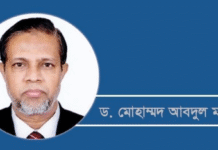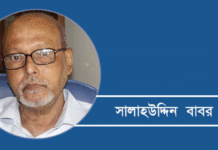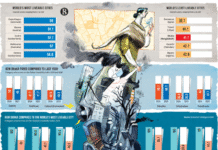Nadeem Qadir
I was reading, with interest, the New York Times editorial of February 12 as I travelled through the heart of Dhaka, amid the traffic, to the Ekushey Boi Mela, when two homemade bombs exploded somewhere nearby.
I tried to look around, but everything seemed to be as normal as it usually is despite the BNP-Jamaat general strike and blockade. Ah! It must be the ghost of Pakistan angered by the rush of people to the Boi Mela (Ekushey Book Fair), ignoring all their threats.
As I walked to the Suhrawardy Udyan, where the main part of the fair is located, people were discussing the “disgusting” terror tactics with anger about politics in general and the opposition in particular.
One man was saying to his friends: “My whole holiday was ruined as I felt it was unsafe to travel to other parts of the country, but the book fair gave me courage.” He asked: “What kind of politics is this? Somebody said those two bombs were exploded to remind us the strike was in force as it has become a part of our lives.”
I found the second statement worrying. Is Bangladesh is falling into the grips of religious extremists who sell religion for political goals just as in Pakistan, and will we be living with bombs like those that go off often in Peshawar and other Pakistani cities? Something serious has to be done, and the government must address it urgently and with a tough hand.
On entering the part of the fair in Suhrawardy Udyan, amid some dust and a good crowd, I totally forgot all about politics and the bombings outside. I found the real Bangladesh with its real people. Writers and students dominated, with the presence of famous writers drawing a bigger crowd.
I picked up a book called Sheikh Mujib Amar Pita (Sheikh Mujib is my father) by Sheikh Hasina, followed by Sharey Teen Haath Bhumi by Imdadul Huq Milon, and Arifur Rahman’s Ekaturer Gopon Dalil.
The salespeople told me all three were selling well, and I was lucky to get an autograph from Milon bhai.
The best part about the fair is that we always get to meet friends, especially some we hardly get to see at all. One question that is always asked: “Hey, what will happen … this politics of bombing will get us nowhere.”
“What do you say? You are a journalist, give us your assessment.” I replied: “My friends, even if I give my best assessment, these days, I am attacked personally for my views. Yet, since you have asked, I am glad to say by March this year, life will be as beautiful as it was before.”
Many were astonished. But I have a gut feeling, and I will wait and see what happens to my prediction.
As I mentioned, I was reading the NYT editorial called “Bangladesh on the brink.” It said Bangladesh “is on the edge of political chaos” and blames, like old times, both Prime Minister Sheikh Hasina and Khaleda Zia for their intransigence, and said it feared “the wave of violence … risks spinning out of control.”
Now, how can NYT be so uninformed and write an editorial based on apparently biased inputs? We know the BNP-Jamaat clique has been spending millions to feed lies and baseless information to the international media.
I have said that this political situation is not like the previous ones, and again I will reiterate that BNP-Jamaat, except for gaining power, has no real issue at hand, which in turn has no popular support.
Thus, the ruling Awami League and its allies will bring the situation under control.
The NYT said Sheikh Hasina, instead of seeking a “political compromise,” “seems bent on neutralising her opponent.” This sounds like a BNP statement. NYT should ask itself what the issues on the ground are, and if the BNP-Jamaat has a real issue except for seeking another election as they boycotted the parliamentary elections of January 5, 2014.
One thing NYT seemed to be well briefed on is that the “goons” of Khaleda Zia has resorted to “violent attacks” that has claimed over 60 lives as of February.
That the NYT, on one hand, said Sheikh Hasina is adamant on neutralising her opponents, while on the other hand, the country was on the brink of total chaos, seems out of line. To control the chaos that could bring great harm to the country, the prime minister has ordered her security forces to ensure terror-free lives for the citizens.
When the security forces are trying to calm the situation, it is taken as a measure to “neutralise” opponents.
The NYT should be reminded first, that it was Khaleda Zia who had said that a caretaker government was nothing but insane, while the same BNP leader killed the concept by appointing her party member, President Abdur Rahman Biswas, as the head of a caretaker government in 2006.
That, in turn, brought about the famous 1/11 and its military-backed caretaker regime.
Sheikh Hasina has tried to hold talks since before the 2014 elections, but she was insulted.
Government leaders have said in recent days that talks on electoral reforms or other issues could be held if BNP breaks its alliance with Jamaat, a terrorist orgainsation, and once it stops its current terror attacks that have so far killed countless people with fire bombs, and maiming many more.
Thus, I must conclude by asking: Is the NYT losing its depth in writing editorials, or will it again fall prey to campaigns by the BNP-Jamaat terror clique?
Source: Dhaka Tribune










I think this writer writes often and seems to be an Awami Leaguer. He has twisted facts with fiction to show BNP as bad. NYT is right. Both parties have destroyed the semblance of sanity in Bangladesh. Why can’t this writer write facts and not be apologetic for the party that uses RAB to kill opposition leaders and also some opposing people within their party. Hundreds of opposition folks got hijacked and disappeared or killed. What about opposing reporters who had to give their lives. Did the PM cry for them? She knows who killed Shagor- Runi but will not turn those people in. People know who killed them. There are thousands of murders and abductions like these that need to scrutinized. AL and its supporters like this writer look the other way when Awami League rulers violate human rights with impunity.